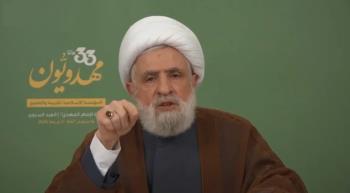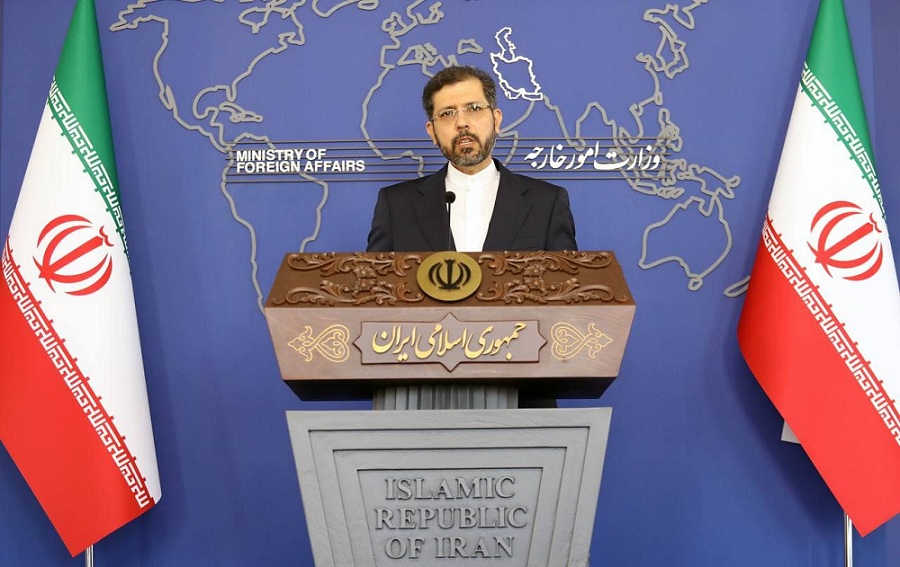Alwaght- The spokesman for the Iranian Foreign Ministry emphasized on Monday that the issue of Palestine is the top priority of the Muslim world, condemning the latest acts of aggression by Israeli forces against worshipers at the al-Aqsa Mosque compound in the Old City of occupied al-Quds.
“We are witnessing that the first issue of the Muslim world, which is Palestine, has slipped into oblivion. The Zionist regime is cunningly and deceitfully trying to sideline the matter,” Saeed Khatibzadeh said at a weekly press conference in Tehran.
He added that Palestine is still the most crucial issue of the Muslim world, irrespective of all conspiracies being hatched by the Tel Aviv regime against it.
Khatibzadeh also noted that the issue of Palestine is the top priority of the Organization of Islamic Cooperation (OIC) and all freedom-loving countries that stand against racism.
The Iranian diplomat said the normalization of diplomatic relations between some Arab countries and Israel has emboldened the latter to press ahead with its criminal acts.
Resumption of Vienna talks high on negotiators’ agenda: Spokesman
Elsewhere in his press conference, Khatibzadeh said that the resumption of negotiations in the Austrian capital over the removal of all sanctions that the United States imposed on Tehran is high on the agenda of delegates from the Islamic Republic and the five remaining parties to the 2015 deal.
“Anything to do with Iran, the European Union, Russia, and China has been settled during the talks. [Enrique Mora, the European Union’s] coordinator for the negotiations is pushing through what remains between Iran and the United States,” he said.
He underlined that both Iranian Foreign Minister Hossein Amir-Abdollahian and European Union foreign policy chief Josep Borrell agree that the prolongation of the halt of the talks in Vienna on a possible revival of the 2015 deal, officially called the Joint Comprehensive Plan of Action (JCPOA), is not in the best interest of the negotiations.
Khatibzadeh further said a face-to-face meeting would better be arranged as soon as possible.
“No decision has yet been made on the venue and the level of the meeting, but it is high on the agenda. What is important is that the talks have not been stopped and are still underway despite the respite,” the Iranian diplomat pointed out.
Negotiations have been held in the Austrian capital since April last year to restore the JCPOA, which was ditched by former US President Donald Trump in May 2018.
In quitting the agreement, Trump introduced what he called the “maximum pressure” campaign to bring Iran to its knees. Tehran maintains that the policy has failed dismally. The Joe Biden administration agrees, yet it has not taken any tangible steps to deliver on its promise of repealing the policy.
In recent months, Iran has cited Washington’s indecisiveness as the reason behind the protraction of the talks, as a number of key issues remain unresolved, ranging from the removal of all post-JCPOA sanctions to the provision of guarantees by the American side that it will not leave the deal again.
IAEA notified of centrifuge machines’ transfer: Khatibzadeh
Katibzadeh went on to say that the International Atomic Energy Agency (IAEA) was notified of a transfer of Iranian centrifuge machines from TESA Karaj Complex, a centrifuge component manufacturing workshop near Tehran, to Natanz facility, and that the move took place nearly one year after an act of sabotage damaged cameras at the former site.
“Iran is a member of the Non-Proliferation Treaty (NPT). The centrifuges were transferred to a safe location following an act of sabotage and with prior notification of the agency,” he highlighted.
In a statement on January 31, the IAEA said Iran has informed the agency that it would move the production of centrifuge rotor tubes and bellows from TESA Karaj Complex to the central city of Isfahan.
The IAEA confirmed that Iran has informed the agency that it can adjust its surveillance and monitoring measures accordingly, noting that the production of centrifuge rotor tubes and bellows at TESA Karaj Complex has ceased.
The IAEA inspectors had installed surveillance cameras in a new workshop in Isfahan on January 24 to ensure the machines intended for the production of centrifuge rotor tubes and bellows were under monitoring but the production of the parts there had not started then.
Khatibzadeh also pointed to the recent dispute between Iranian and Afghan border guards at the Islam Qala-Dogarun border crossing.
“Our zealous border guards have been stationed on the borders with Afghanistan because of the internal [security] situation in the neighboring country. They have a responsibility to prevent any illegal trafficking,” he stated.
In response to a question about the latest wave of bombings that have targeted members of the Shia Hazara ethnic group in Afghanistan, Khatibzadedh said, “The situation in Afghanistan, including all ethnic and religious groups, has been always important to the Islamic Republic of Iran.”
“It is the sole responsibility of the current rulers of Afghanistan (the Taliban) to ensure the security of all ethnic groups in the country. They have not yet been able to establish security in some regions.”



























